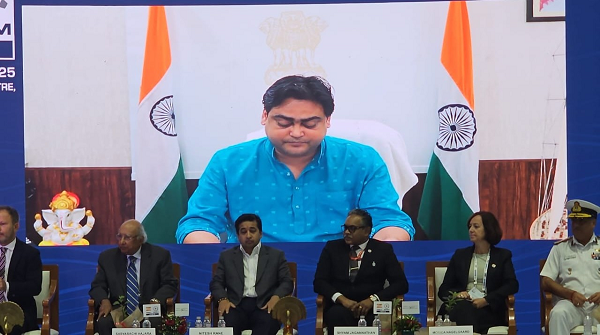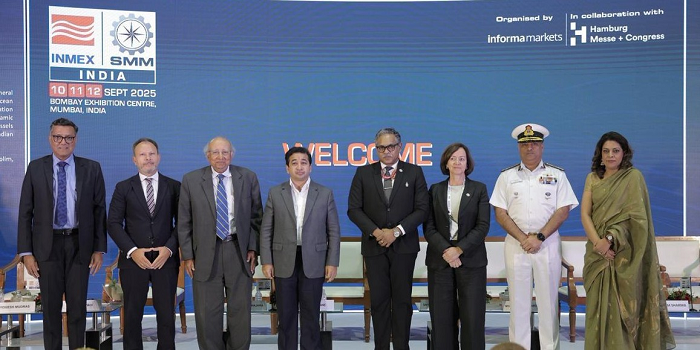
Informa Markets in India, successfully hosted the 14th edition of INMEX SMM India 2025, South Asia’s premier maritime event at the Bombay Exhibition Centre, Mumbai. The show runs from 10th to 12th September 2025, bringing together global and domestic maritime stakeholders under the central theme “Building India’s Blue Economy: Shipbuilding & Repair as Growth Drivers”. With 250+ leading maritime brands, 20+ international pavilions, 80+ expert speakers, and 9,000+ visitors, INMEX SMM India 2025 continues to serve as a catalyst for knowledge exchange, strategic collaborations, and sustainable growth in South Asia’s maritime ecosystem.
The event was inaugurated in the presence of esteemed guests including Shri Nitesh Rane, Hon’ble Minister of Fisheries & Ports Development, Government of Maharashtra; Shri. Shantanu Thakur, Hon’ble Minister of State, Ministry of Ports, Shipping and Waterways, Govt of India; Shri Shyam Jagannathan, Director General of Shipping, Ministry of Ports, Shipping and Waterways; Mr. Sabyasachi Hajara, Chairman, INMEX SMM India Advisory Board; Inspector General Bhisham Sharma, PTM, TM, Commander, Indian Coast Guard Region (West); Ms. Monica Nagelgaard, Consul General, Royal Norwegian Consulate General Mumbai; Mr. Ulas Boyaci, COO Exhibitions, Hamburg Messe und Congress GmbH and Mr. Yogesh Mudras, Managing Director, Informa Markets in India.

Shri Nitesh Rane, Hon’ble Minister of Fisheries & Ports Development, Govt of Maharashtra, said “Shipbuilding and repair have historically shaped maritime powers, and today more than 95% of global shipbuilding is concentrated in Asia, led by China, Korea, and Japan, with India’s share still less than 1%. Guided by the Maritime India Vision 2030 and the Maritime Amritkal Vision 2047, India has set clear ambitions—to be among the top 10 shipbuilding nations by 2030 and the top 5 by 2047. The Government of India has reinforced this mission with initiatives such as the ₹25,000 crore Maritime Development Fund, the Shipbuilding Financial Assistance Policy 2.0 extended till 2036, incentives for green fuel vessels, infrastructure status for shipyards, and the right of first refusal for Indian-built ships.”
” Maharashtra, as the gateway of India’s maritime trade with 877 km of coastline, two major ports, 16 non-major ports, and the upcoming Vadhavan Port, has taken a pioneering step by introducing India’s first Shipbuilding, Ship Repair, and Ship Recycling Policy 2025. The policy aims to contribute one-third of India’s shipbuilding and repair targets under MIV 2030 and MAKV 2047, with six planned shipyard clusters at Dighi, Jaigarh, Dabhol, Vijaydurg, Nandgaon, and Bankot, along with 11 stand-alone shipyards at strategic coastal locations. Key features include a 15% capital subsidy on project costs during execution, fiscal stimulus of up to ₹5 crore or 60% of project costs for infrastructure, R&D, and upskilling, and ₹1 crore or 50% of annual costs for workforce recycling and training. This framework is expected to unlock investments of over ₹18,000 crore and create more than 1.4 lakh jobs by 2047. Complementing this, the state is also advancing initiatives such as policy frameworks for land management and waterfront allotment, DPRs for passenger water transport in the Mumbai Metropolitan Region, and techno-economic feasibility studies for shipyard clusters.”
Shri. Shantanu Thakur, Hon’ble Minister of State, Ministry of Ports, Shipping and Waterways, Govt of India, said “The Government of India, through the Ministry of Ports, Shipping and Waterways and the Directorate General of Shipping, is committed to positioning India as a new hub for shipbuilding. The nation has a clear goal of ranking among the top 10 maritime nations by 2030 and among the top 5 by 2047. Shipbuilding and repair will serve as vital growth engines of India’s blue economy, generating employment, enhancing global competitiveness, and driving sustainability through green shipping initiatives and modernized infrastructure.”
Shri Shyam Jagannathan, Director General of Shipping, Ministry of Ports, Shipping and Waterways, said “India’s strong economic momentum is evident with a GDP of 4.2 trillion dollars today and projections reaching between 26 and 35 trillion dollars in the coming decades. While the maritime sector currently contributes 4% to India’s GDP and just 1% of global tonnage, the vision is to raise its share to 12% of national GDP and advance from the 16th position globally to the 5th by 2047. Indian seafarers already represent 12% of the global workforce, with a goal to expand this to around 25%, making shipbuilding and repair central to this transformation. The government is strongly supporting this ambition through initiatives such as the Shipbuilding Finance Assistance Scheme, the Maritime Development Fund, shipbuilding and repair clusters, a national shipbuilding mission, the Shipbreaking Credit Note scheme, and upfront subsidies of up to 30 percent for non-conventional builds. Under Maritime India Vision and Amrit Kaal Vision, India is firmly on course to emerge as a global maritime superpower.”
Mr Sabyasachi Hajara, Chairman, INMEX SMM India Advisory Board, said “The Government of India has taken unprecedented measures to boost the maritime sector, including the establishment of a $3 billion Maritime Development Fund, with nearly 45% earmarked for shipbuilding and ship repair, and 20% for building Indian tonnage, alongside investments in port infrastructure and coastal shipping. While India currently accounts for about 1% of global tonnage with around 18 million deadweight and ranks 16th globally, these initiatives are expected to help the nation move into the top 10 maritime powers. Similarly, though India’s share in the $200 billion global shipbuilding industry is under 1%, the country is making remarkable strides in building green ships, reflecting its commitment to sustainable growth and global competitiveness.”
Inspector General Bhisham Sharma, PTM, TM, Commander, Indian Coast Guard Region (West), said “With 11,000 kilometers of coastline, 1,300 islands, and a 2.3 million square kilometer exclusive economic zone, India’s vast maritime domain presents both immense opportunities and complex challenges, including piracy, smuggling, and environmental risks. As the fourth-largest Coast Guard in the world, the Indian Coast Guard has consistently safeguarded these waters—saving lives, averting ecological disasters through firefighting operations, and neutralizing narcotics consignments—true to its motto Vayam Rakshamah, We Protect. In this backdrop, INMEX SMM India emerges as a strategic platform, aligning operational imperatives with innovations in unmanned systems, AI-enabled surveillance, pollution mitigation, and advanced communication networks, while complementing the Hon’ble Prime Minister’s Amrit Kaal vision for advancing India’s blue economy.”
Ms Monica Nagelgaard, Consul General, Royal Norwegian Consulate General Mumbai, said, “Norway leads globally in maritime innovation, from LNG-powered vessels to battery, hydrogen, ammonia, and methanol technologies. India, with its extensive coastline, growing fleet, and trillion-dollar maritime investment plans, is a key partner in advancing the green transition. The India–EFTA Trade and Economic Partnership Agreement will further strengthen the synergy between Norway’s innovation and India’s scale, talent, and ambition, setting new benchmarks for sustainable maritime growth.”
Mr Ulas Boyaci, COO Exhibitions, Hamburg Messe und Congress GmbH, said “INMEX SMM India has established itself as South Asia’s premier maritime exhibition and conference, held in alternate years with SMM Hamburg, the world’s leading maritime trade fair. This year’s edition highlights a remarkable European presence with the Greek pavilion featuring 8 exhibitors, the Netherlands debuting with 10 specialized exhibitors, and Germany showcasing its largest-ever participation in India with eighteen exhibitors supported by the Federal Ministry of Economic Affairs and Energy. Together, these initiatives reflect the growing strength of Europe–India collaboration and reinforce a shared commitment to innovation, sustainable growth, and long-term maritime partnerships.”
Speaking at the inauguration of INMEX SMM India, Mr. Yogesh Mudras, Managing Director, Informa Markets in India, said “India’s maritime sector is steadily emerging as a cornerstone of the nation’s growth story, with shipbuilding and repair positioned as pivotal drivers of the Blue Economy. A key enabler of this transformation is the increasing private sector participation, supported by progressive policies such as 100% FDI under the automatic route in shipping and shipbuilding. Public-private partnerships are also playing a defining role, with the government’s USD 82 billion investment plan to expand port capacity by 2035 marking a decisive step toward modernizing infrastructure. Simultaneously, India’s active participation in global initiatives such as the India-Middle East-Europe Economic Corridor (IMEC) highlights its growing importance in securing strategic access to global trade routes and strengthening its role in the Global South.”
Industry Overview
India’s maritime and shipping sector is witnessing significant momentum, driven by strong policy support and rising investments. The Union Budget 2025–26 extended the Shipbuilding Financial Assistance Policy (SBFAP) 2.0 with an outlay of Rs. 18,090 crore (US$ 2.08 billion), providing subsidies to Indian shipyards to reduce costs and enhance domestic competitiveness.
To strengthen Inland Water Transport (IWT), the government introduced the “Jalvahak” Cargo Promotion Scheme in December 2024, offering 35% reimbursement on operational costs and initiating scheduled cargo services along key national waterways. In parallel, Sagarmala 2.0 has been launched with Rs. 40,000 crore (US$ 4.64 billion) support to drive shipbuilding, repair, breaking, and recycling, aiming to attract Rs. 12 lakh crore (US$ 139.11 billion) in investments over the next decade.
Additionally, in FY25, 962 acres of land were allocated for port-led industrialization, with potential to generate Rs. 7,565 crore (US$ 887.80 million) and future investments. Reflecting this progress, India’s maritime freight market, valued at USD 34.90 billion in 2024, is projected to reach USD 50.70 billion by 2033, growing at a CAGR of 3.80% during 2025–2033.
Strong Industry & Association Support
The event is further strengthened by the support of leading industry bodies, including the Shipyard Association of India, International Ship Engineering Service Association (ISES), Institute of Marine Engineers India, Foreign Owners Representatives and Ship Managers Association (FOSMA), Indian National Shipowners’ Association (INSA), Emirates Shipping Association, Netherlands Maritime Technology, VDMA Power Systems, the Maritime Association of Shipowners, Ship Managers and Agents (MASSA), the Busan Chamber of Commerce and Industry, Enterprise Greece, and HEMEXPO—highlighting the platform’s credibility and industry-wide reach. Key exhibitors participating are Chowgule & Company (SBD), Colombo Dockyard Ltd, Marine Electrical, DYNAMICNORD GmbH, Volvo Penta, Wilhelmsen, Henkel, Synergy Shipbuilders, Class NK and many more.
A major highlight of INMEX SMM India 2025 is its three-day conference including the Maritime Leaders’ Forum and CTO Conclave addressing strategic growth, green shipping, automation, and AI. Dedicated sessions are also spotlighting skill development, seafarer wellness, and women in maritime leadership. On the exhibition floor, international pavilions from the Netherlands, Germany, Korea, and Greece, along with a Domestic Shipyard Pavilion, are showcasing advanced shipbuilding and repair capabilities. Adding to the momentum, the Maritime Excellence Awards are honouring industry stalwarts and change makers driving innovation, sustainability, and growth.











